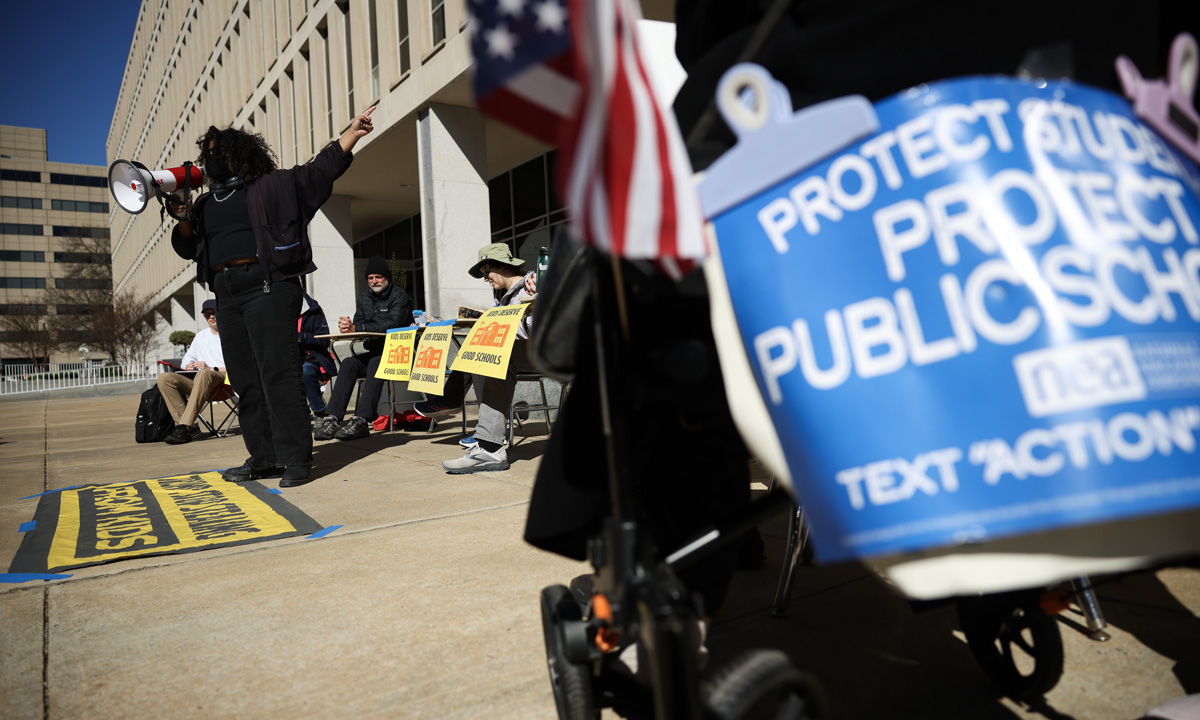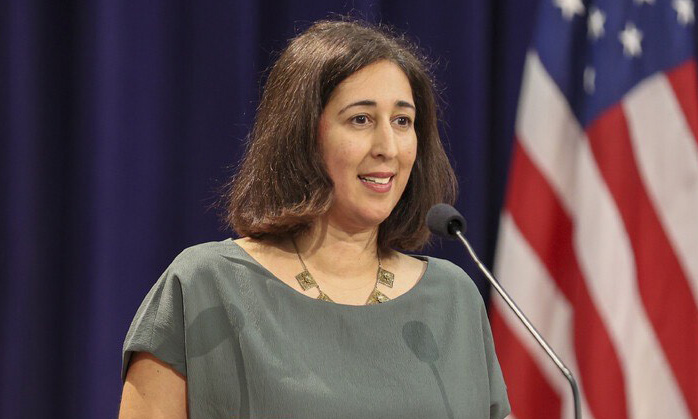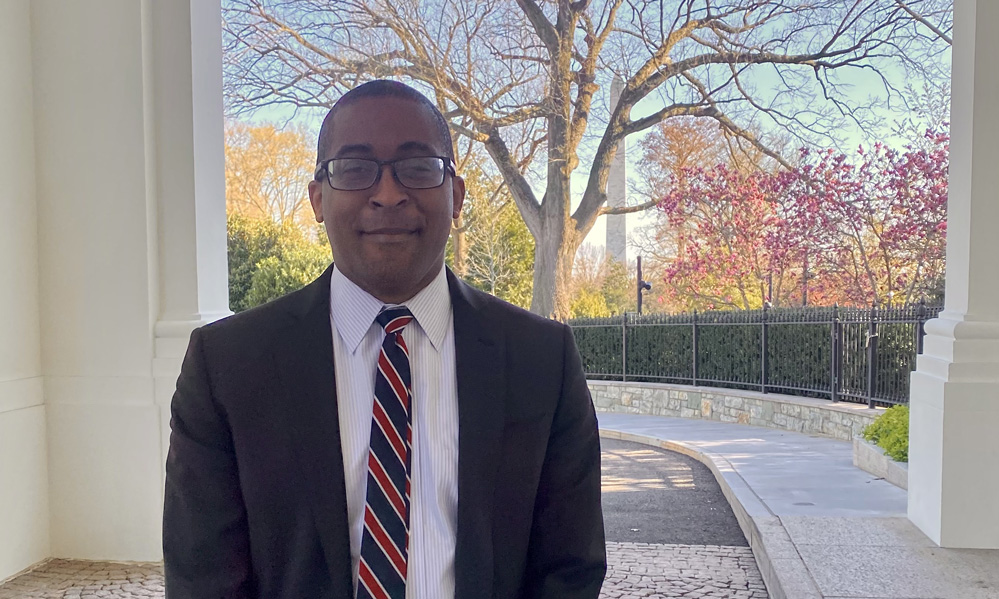Nonprofit Wants to Take on Civil Rights Cases Trump’s Education Department Left Behind
Capitalizing on ‘brain drain’ caused by mass firings, the National Center for Youth Law is hiring former department attorneys to resolve complaints.

Get stories like this delivered straight to your inbox. Sign up for The 74 Newsletter
For nearly a decade, Shaheena Simons led the division that fought for students’ civil rights at the U.S. Department of Justice.
Her tenure encompassed President Donald Trump’s first term, a time when staff still addressed the “full range of complaints” — from racial and gender discrimination to schools denying services to students with disabilities.

But to Simons, the Justice Department’s recent dismissal of a school desegregation order in Louisiana — at a time when racial and socioeconomic isolation continues — is a sign that the current administration has turned its back on students who don’t receive an equal education. It’s why she left the Educational Opportunities Section at the DOJ after 14 years in April.
“The administration has been very clear that resources are going to be allocated to certain identified priorities,” she said — primarily keeping trans students out of women’s sports and punishing universities it accuses of tolerating anti-semitism. But that agenda, she said, “is leaving a lot of parents and kids with nowhere to turn.”
Now she aims to be part of a solution. She’s lending her expertise to a new initiative intended to give families another way to resolve their concerns — the Public Education Defense Fund.
The National Center for Youth Law, a 50-year-old nonprofit, will launch the project on Friday to help families with complaints that the DOJ or the Office for Civil Rights at the Education Department either won’t acknowledge or no longer has the capacity to investigate. Simons will co-chair the fund’s advisory council.
Announced in advance of Saturday’s 71st anniversary of the Brown v. Board decision ending segregation, the effort will include a fellowship program for former OCR attorneys who lost their positions when the Trump administration gutted the agency and closed seven regional offices in March. The goal is to capitalize on the “brain drain” caused by the elimination of nearly 250 OCR staffers and connect families with pro bono attorneys who can conduct investigations and bring lawsuits to resolve their concerns.
“I have zero confidence in [the department’s] ability to administer the system effectively,” said Johnathan Smith, chief of staff and general counsel at the center. “I think most parents who are looking at what’s happening probably would reach the same conclusion.”
As it shifts attention away from discrimination against LGBTQ students and racial minorities, OCR has left thousands of complaints untouched and dismissed many others. Trump’s 2026 budget proposal calls for an additional 35% cut to the office as the administration pushes to eliminate the department.
The center, along with parents and special education advocates, sued the department over the firings, and asked the District of Columbia federal court to immediately reinstate staff. A hearing is set for May 20.
Andy Artz was a supervising attorney in OCR’s New York City office until March 11, when the department placed him and hundreds of other department staffers on leave and locked them out of their computer systems. He was in the middle of helping a student who had been denied access to a senior trip because of multiple disabilities and close to reaching a resolution for a victim of sexual assault by a classmate.
“I found the work really meaningful,” said Artz, who hopes to work with the fund. “OCR was able to do a great job helping school districts and universities understand their obligations.”
To the new administration, however, OCR perpetuated discrimination by focusing on diversity, equity and inclusion and harmed women by extending Title IX protections to transgender students.
“Let me be clear: it is a new day in America,” Acting Assistant Secretary for Civil Rights Craig Trainor said when the department announced an investigation into a gender-neutral bathroom in Denver schools. “Under President Trump, OCR will not tolerate discrimination of any kind.”
Even if the court blocks the job cuts, it’s unclear whether attorneys would be allowed to return to cases that don’t align with the administration’s priorities. Smith still sees a need for the new project.
His team will work with local NAACP chapters, bar associations and other community organizations to get the word out about the OCR alternative, Smith said.
In addition to seeking attorneys who will represent students pro bono, the fund hopes to attract some of the talent forced to leave the federal government by offering four- to six-month fellowships. Attorneys will receive a $12,500 stipend and non-attorneys will receive $9,000. Depending on funding, Smith expects up to 10 fellows in the first round.

‘Top-performing personnel’
When Trump was inaugurated, OCR had over 12,000 open cases, according to its website. But the database hasn’t been updated since before the new administration took over. According to Julie Hartman, a department spokeswoman, OCR continues to “evaluate all legitimate complaints” and has initiated over 200 disability-related investigations and dozens related to Title IX and anti-discrimination laws.
“OCR’s staff is composed of top-performing personnel with years of experience enforcing federal civil rights laws who work vigorously to protect all Americans’ civil rights,” she said.
She declined to comment on the fund specifically, but said the department “welcomes support from — and has often worked with — outside groups who want to advocate for students and families and help those who believe that their civil rights have been violated.”
Factoring in staff reductions and those who left voluntarily, Artz estimates that only about a third of OCR’s staff remains out of the over 560 attorneys, supervisors and other employees who worked there last fall.
As a former deputy assistant attorney general during the Obama administration, Smith doesn’t solely blame Trump for OCR being “terribly backlogged.”
“It was a system that often was a black hole for families,” he said. “What does it mean to have an Office for Civil Rights that’s actually responsive to families and to young people?”
For Callie Oettinger, a Fairfax County, Virginia, parent and special education advocate, getting OCR to act has yielded mixed results. She has seen complaints linger for years as well as recent steps by the new administration to act on disability cases.
OCR still hasn’t completed a probe into her 2019 complaint that the Fairfax district denied transportation to students with disabilities who needed extra time to complete the PSAT. At the same time, she’s noticed an uptick in OCR investigations on more recent issues. Since early April, officials have responded to two complaints she’s involved in, one filed in December and another in March.
“It’s not clear why they’re starting where they’re starting,” she said. “Things are definitely moving forward, but they’re not doing themselves a favor by keeping their website so outdated.”
Others are looking elsewhere for relief.
In Delaware’s Cape Henlopen School District, Louise Michaud Ngido, an English language teacher, said she’s heard nothing about her complaint that schools have failed to provide English learners with adequate support. Students new to the country, she said, don’t receive specific English development classes and staff members don’t provide translation services or interpreters for parents. The district denied any discrimination.
Under Cardona, OCR opened an investigation last October, but Ngido has heard nothing since. She said she hopes Delaware will be “more proactive” and investigate complaints that OCR won’t.
Department of Justice priorities
At least one Republican proposal to eliminate the education department would shift OCR’s workload to the DOJ. But the education staff there has always been a fraction of the size of OCR’s. Simon’s former office once had 40 attorneys. Now, she said, it has six.
The agency’s priorities have also changed.
In an interview with the Epoch Times, a conservative media outlet, Harmeet Dhillon, assistant attorney general for civil rights, said her agenda includes doing “some law enforcement” against hospitals conducting gender-affirming surgeries, elevating parental rights and dismissing school district consent decrees over desegregation.
The DOJ said in a press release that it ended its “probing federal oversight” of integration efforts in Louisiana’s Plaquemines Parish schools because the district was spending “precious local resources” to meet past administration’s demands for data on issues such as hiring and discipline.
In the interview, Dhillon said the department wants to “let people off the hook” if they corrected past discrimination. Consent decrees, in which a district pays a court-appointed monitor for ongoing oversight, are “a powerful tool” and appropriate when there’s been severe corruption or racism, she said. “What’s not appropriate is to maintain these rent-seeking financial arrangements … beyond their normal life cycle.”
But Simons, the former DOJ section chief, said Black students are still disciplined at higher rates than their white peers and are more likely to attend “crumbling” schools. Research shows that racial and socioeconomic isolation has steadily increased since the 1980s.
“Segregation persists; inequality persists,” she said.
Working with universities to collect and preserve existing data is another one of the fund’s goals. The administration, Smith said, might point to a declining number of OCR complaints as evidence of fewer problems in schools, when, in fact, it’s a byproduct of fewer investigations.
“We want to be able to counter that narrative by showing that just because people aren’t going to OCR doesn’t mean that there aren’t real concerns and real issues of discrimination in our schools,” he said.
‘The aid of legal counsel’
Jackie Wernz, a civil rights attorney and consultant who worked at the department during the Obama and first Trump administrations, said it’s important for nonprofits like the center to “step up,” but cautioned that outside efforts have limitations.
“Without a robust federal civil rights arm, civil rights in this country are not going to be enforced,” she said.
States don’t have the same expertise and resources, she said, and it’s unclear who would enforce any changes.
But Smith countered that the bulk of what OCR investigators do is negotiate solutions between families and district staff.
“Having parents and children do that with the aid of legal counsel,” he said, “will yield far better results and outcomes than if they try to navigate those systems on their own.”
Get stories like these delivered straight to your inbox. Sign up for The 74 Newsletter

;)
